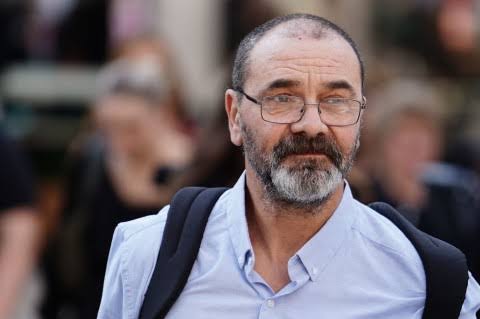- The 57-year-old was left ‘sickened’ by the idea of paying for ‘board and lodging’ from any compensation he obtains under the government’s miscarriage of justice scheme
- Mr. Malkinson also highlighted the ‘unjust rule’, which could have seen him forced to hand tens of thousands of pounds of his payout back as ‘rent’ for his time spent in prison, following his release last week
A man who spent 17 years in jail for a rape he didn’t commit has said £1million compensation is ‘not enough’ for him after spending nearly two decades behind bars.
Andrew Malkinson had his conviction quashed last month after fresh DNA evidence emerged linking another potential suspect to the crime.
But the 57-year-old was left ‘sickened’ by the idea of paying for ‘board and lodging’ from any compensation he obtains under the government’s miscarriage of justice scheme – which itself caps payments at £1m.

Justice Secretary Alex Chalk KC scrapped the rule with immediate effect on Sunday in the wake of Mr Malkinson’s case.
Speaking to Sky’s crime correspondent Martin Brunt, Mr. Malkinson said: ‘I think it [the rule] is abhorrent. It is a very silly, very vindictive, actually. It is completely necessary.’
The 57-year-old also criticised the payout he is likely to receive, which is limited to £1million for victims of a miscarriage of justice who have served ten years or more, pointing out he has spent almost double that time behind bars.
Mr Malkinson said: ‘It’s pretty lamentable. £1million sounds like a lot of money, but that represents nearly two decades of living hell and lost opportunities and lost love and everything else that makes life precious.
‘It’s capped at ten years, but what happens to people like me who’ve spent much longer than ten years [in prison], almost double? It seems very unfair.

‘I don’t think any amount would be enough, but it should be significantly higher than it is.’
He said it could take years for him to receive the money, which he admitted would help him live the rest of his life ‘in relative comfort’.
But he insisted: ‘It’s the least they can do for me. It can never replace the joy I’ve lost and the happiness I could have had.’
Mr. Malkinson also highlighted the ‘unjust rule’, which could have seen him forced to hand tens of thousands of pounds of his payout back as ‘rent’ for his time spent in prison, following his release last week.
Downing Street later indicated that Rishi Sunak believed the deductions were unfair and yesterday Justice Secretary Alex Chalk KC announced the scheme was being scrapped with immediate effect, saying: ‘This common sense change will ensure victims do not face paying twice for crimes they did not commit.’
The former security guard welcomed the move but said it was the ‘first of many changes we need in our justice system to protect the innocent’.
Mr Malkinson, of Grimsby, Lincolnshire, was found guilty of the 2003 attack on a woman in Salford, Greater Manchester, and a year later was sentenced to at least seven years imprisonment at Manchester Crown Court.
READ MORE: Mum of kids found locked in cages says she didn’t call cops as ‘the dad abused her too’
He remained in jail for a further ten years after he maintained his innocence.
There was never any DNA linking him to the crime and he always insisted he was not guilty.
His case was referred to the Court of Appeal in January after another man’s DNA was found on fragments of the victim’s clothing.
Sir Bob Neill, the Tory MP who is chairman of the Commons justice committee, said he was ‘delighted’ that Mr Chalk had ‘moved so swiftly’, following Mr. Malkinson’s release, to scrap the scheme.

‘But he suggested ministers should go further and retrospectively refund those miscarriage of justice victims who have already had their compensation docked. I wonder if the Government could consider ex-gratia payments on a case-by-case basis,’ the MP said.
Emily Bolton, the director of the charity Appeal and Mr Malkinson’s solicitor, called for a stronger response from the Government.
She said: ‘The state robbed Andy of the best years of his life. Changing this one rule is not an adequate response. We need a complete overhaul of the appeals system.
‘In order to be eligible for compensation, people must apply within two years of being pardoned or having their convictions reversed.’







